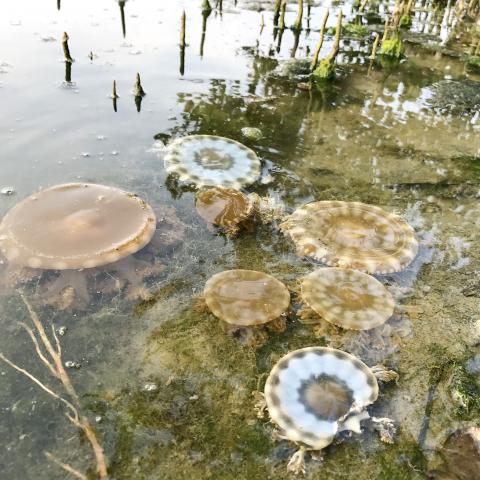Kaohsiung’s Marine Wetlands Park in the city’s Linyuan District (林園) yesterday announced that upside-down jellyfish, once the main attraction of its coastal lagoons, have returned.
The upside-down jellyfish did not appear in the park’s lagoons between 2016 and last year because industrial waste was dumped into the lagoons, park officials said.
The wetlands park once had the only lagoon where up to 10,000 jellyfish would congregate, the park said, adding that many former school children undoubtedly have fond memories of their field trips to the area.

Photo: Hung Chen-hung, Taipei Times
However, industrial pollution drove away the jellyfish and caused a drastic drop in the number of visitors, the park said.
The Linyuan District Mangrove Conservation Society, which works with the park, is now taking reservations for group tours, society director-general Su Wen-hua (蘇文華) said.
“According to our observations, the number of jellyfish is at its lowest from June to August and slowly increases starting each September,” Su said.
January and February are the creatures’ breeding season and the best period for observing the jellyfish, Su added.
Outside the park, jellyfish have also been spotted in ditches in the district’s Gangpu (港埔) and Shanwei (汕尾) areas and there have been sightings of sea anemones, Su said.
This is due to pumps drawing in the jellyfish and sea anemones when local aquaculture farmers are piping in saltwater for their ponds, Su said.
A thicker layer of sediment at the bottom of the lagoons could be one of the reasons why the population of jellyfish cannot compare with its peak of 10,000, Su said.
The number of fish in the lagoons and the sediment kicked up when fish swim around is also not conducive to the growth of jellyfish, Su said.
His organization hopes to work with the park to create a suitable habitat for the jellyfish, Su said, adding that one method would be to artificially change the direction of the current to wash away the sediment.
The mangrove society and the park would also call for volunteers to regularly clean the algae off the lagoon’s surface to help photosynthesis inside the jellyfish, Su said.

‘DENIAL DEFENSE’: The US would increase its military presence with uncrewed ships, and submarines, while boosting defense in the Indo-Pacific, a Pete Hegseth memo said The US is reorienting its military strategy to focus primarily on deterring a potential Chinese invasion of Taiwan, a memo signed by US Secretary of Defense Pete Hegseth showed. The memo also called on Taiwan to increase its defense spending. The document, known as the “Interim National Defense Strategic Guidance,” was distributed this month and detailed the national defense plans of US President Donald Trump’s administration, an article in the Washington Post said on Saturday. It outlines how the US can prepare for a potential war with China and defend itself from threats in the “near abroad,” including Greenland and the Panama

A wild live dugong was found in Taiwan for the first time in 88 years, after it was accidentally caught by a fisher’s net on Tuesday in Yilan County’s Fenniaolin (粉鳥林). This is the first sighting of the species in Taiwan since 1937, having already been considered “extinct” in the country and considered as “vulnerable” by the International Union for Conservation of Nature. A fisher surnamed Chen (陳) went to Fenniaolin to collect the fish in his netting, but instead caught a 3m long, 500kg dugong. The fisher released the animal back into the wild, not realizing it was an endangered species at

The Chinese Nationalist Party (KMT) is maintaining close ties with Beijing, the Democratic Progressive Party (DPP) said yesterday, hours after a new round of Chinese military drills in the Taiwan Strait began. Political parties in a democracy have a responsibility to be loyal to the nation and defend its sovereignty, DPP spokesman Justin Wu (吳崢) told a news conference in Taipei. His comments came hours after Beijing announced via Chinese state media that the Chinese People’s Liberation Army’s Eastern Theater Command was holding large-scale drills simulating a multi-pronged attack on Taiwan. Contrary to the KMT’s claims that it is staunchly anti-communist, KMT Deputy

The High Prosecutors’ Office yesterday withdrew an appeal against the acquittal of a former bank manager 22 years after his death, marking Taiwan’s first instance of prosecutors rendering posthumous justice to a wrongfully convicted defendant. Chu Ching-en (諸慶恩) — formerly a manager at the Taipei branch of BNP Paribas — was in 1999 accused by Weng Mao-chung (翁茂鍾), then-president of Chia Her Industrial Co, of forging a request for a fixed deposit of US$10 million by I-Hwa Industrial Co, a subsidiary of Chia Her, which was used as collateral. Chu was ruled not guilty in the first trial, but was found guilty